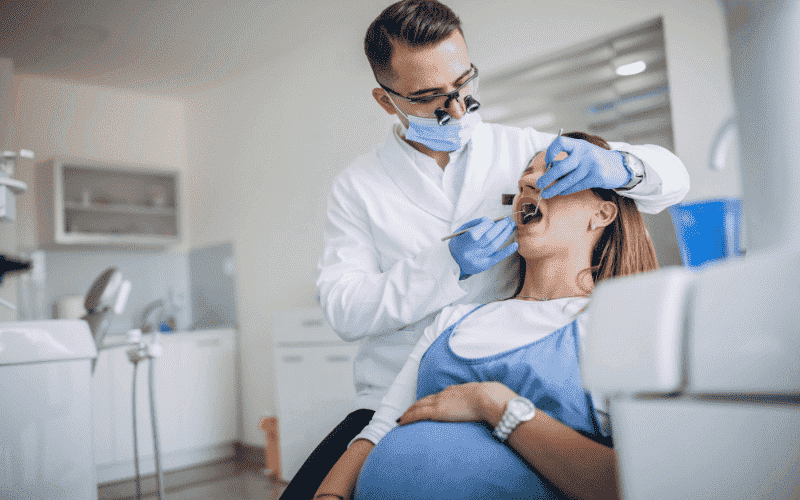ONLINE SCHEDULING AND VIRTUAL CONSULTS AVAILABLE

How to Handle Dental Emergencies During Pregnancy?

Dental emergencies can be stressful and painful, especially during pregnancy. Hormonal changes increase the risk of gum disease and other oral health issues. Pregnant women must prioritize dental health and know how to handle emergencies safely.
This blog provides essential information and tips for managing dental emergencies during pregnancy, ensuring both mother and baby’s well-being.
Common Dental Issues During Pregnancy
Pregnancy affects oral health in several ways. Understanding these common issues helps in taking preventive measures and knowing when to seek help.
Hormonal Changes
- Gingivitis: Increased progesterone levels cause gums to swell and bleed.
- Periodontal Disease: Untreated gingivitis can lead to more severe gum disease.
Morning Sickness
- Enamel Erosion: Frequent vomiting exposes teeth to stomach acids, weakening enamel.
- Dry Mouth: Dehydration from vomiting reduces saliva, increasing the risk of cavities.
Dietary Changes
- Sugar Cravings: Higher sugar intake leads to more plaque and tooth decay.
- Nutritional Deficiencies: Lack of essential nutrients like calcium affects oral health.
Identifying Dental Emergencies
Knowing when a dental issue is an emergency is crucial for timely intervention. Here are some common dental emergencies and their symptoms.
Severe Toothache
- Symptoms: Persistent, throbbing pain, sensitivity to hot or cold, swelling.
- Action: Contact your dentist immediately for advice and possible treatment.
Broken or Chipped Tooth
- Symptoms: Sharp pain, jagged edges, visible cracks.
- Action: Rinse your mouth with warm water, apply a cold compress, and visit an emergency dentist as soon as possible.
Gum Infection
- Symptoms: Red, swollen, or bleeding gums, bad breath, pus around gums.
- Action: Seek prompt dental care at a clinic that offers emergency dental care to prevent complications.
Abscessed Tooth
- Symptoms: Severe pain, fever, swollen face or cheek, tender lymph nodes.
- Action: An emergency dental visit is needed to drain the abscess and treat the infection.
Safe Treatments During Pregnancy
It’s important to know which dental treatments are safe during pregnancy. Here are some guidelines.
Routine Dental Care
- Cleanings and Exams: Safe and recommended, ideally during the second trimester.
- X-rays: Safe with proper shielding, especially if necessary for diagnosis.
Emergency Treatments
- Pain Management: Use acetaminophen for pain relief. Avoid aspirin and ibuprofen.
- Antibiotics: Penicillin, amoxicillin, and clindamycin are generally safe. Avoid tetracycline.
Dental Procedures
- Fillings and Extractions: Safe with local anesthesia. Inform your dentist about your pregnancy.
- Root Canals: Safe, but it is better to postpone elective procedures until after pregnancy if possible.
Preventive Measures
Prevention is key to avoiding dental emergencies during pregnancy. Here are some tips for maintaining good oral health.
Maintain Oral Hygiene
- Brushing: Brush twice a day with fluoride toothpaste.
- Flossing: Floss daily to remove plaque between teeth.
Diet and Nutrition
- Balanced Diet: Eat a variety of foods rich in vitamins and minerals.
- Limit Sugar: Reduce intake of sugary snacks and drinks.
Regular Dental Visits
- Checkups: Schedule regular dental checkups every six months.
- Professional Cleanings: Get professional cleanings to remove tartar and prevent gum disease.
Home Remedies for Temporary Relief
While waiting for a dental appointment, some home remedies can provide temporary relief from pain and discomfort.
Saltwater Rinse
- How to Use: Mix 1 teaspoon of salt in a glass of warm water. Rinse your mouth for 30 seconds.
- Benefits: Reduces inflammation and cleanses the affected area.
Cold Compress
- How to Use: Apply a cold compress to the outside of your cheek for 15 minutes.
- Benefits: Reduces swelling and numbs the pain.
Clove Oil
- How to Use: Apply a small amount of clove oil to a cotton ball and place it on the affected tooth.
- Benefits: Provides temporary pain relief due to its natural analgesic properties.
When to See an Emergency Dentist?
Knowing when to seek professional help is crucial for both your health and your baby’s. Here are some signs that indicate it’s time to see an emergency dentist.
Persistent Pain
- What to Do: Contact your dentist if you experience persistent or severe pain.
Swelling or Infection
- What to Do: Seek immediate dental care from an emergency dentist if you notice swelling, pus, or signs of infection.
Trauma or Injury
- What to Do: Visit your dentist or an emergency dental clinic if you experience a dental injury.
Unresolved Issues
- What to Do: Follow up with your dentist if your symptoms persist despite home remedies.
Managing dental emergencies during pregnancy requires prompt action and preventive care. By understanding common dental issues, recognizing emergencies, and knowing safe treatments, you can ensure your oral health and overall well-being during this crucial time. Regular dental checkups and good oral hygiene practices are essential to prevent emergencies and maintain a healthy smile throughout your pregnancy.




